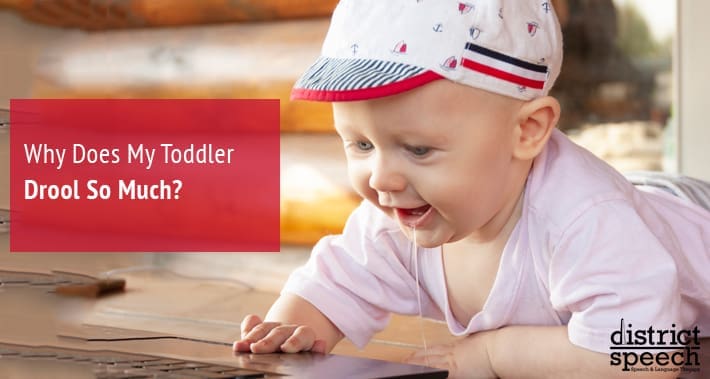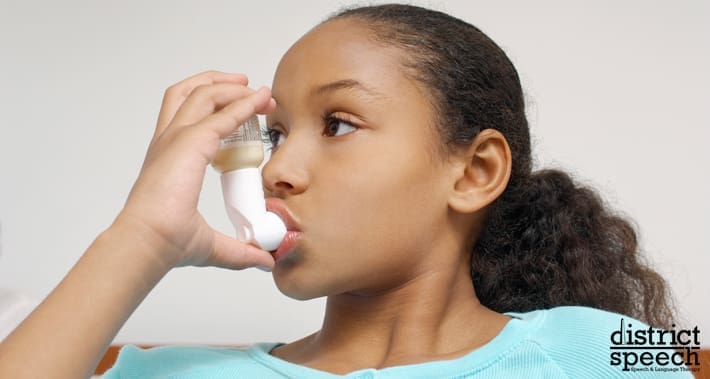
Pretty much all babies drool at some point.
It’s not typically a cause for concern.
However, continued drooling into toddlerhood may indicate an underlying medical condition or disorder.
If your child is struggling with drooling due to an underlying medical condition or disorder, pediatric speech therapy can help.
A speech therapist can help provide solutions for some of the complications associated with excess drooling.
Your child’s speech therapist can provide solutions ranging from feeding and behavioral interventions, to orofacial myofunctional disorders treatment.
Keep reading to learn more about some of the conditions and disorders that may cause excess drooling in children, and how our Washington DC speech pathologists can help.
When Should Your Child Outgrow Drooling?
Every child is different and will grow out of drooling at different rates.
However, children are typically expected to outgrow drooling by 2 years of age, or when teething ends.
By the time your child finishes teething, their saliva production begins to slow down, thereby reducing excessive and uncontrollable drooling.
What Causes Excess Drooling?
There are several potential causes for excess drooling in children, including pediatric dysphagia, other feeding and swallowing disorders, and orofacial myofunctional disorders.
Let’s take a closer look.
1. Pediatric Dysphagia
Pediatric dysphagia is a condition which causes trouble swallowing.
In children with pediatric dysphagia, the process that moves food and liquid from their mouth into their stomach becomes impaired.
If your child is struggling with pediatric dysphagia, you may notice the following symptoms:
- Vomiting
- Back arching while eating
- Inability to eat large amounts of food
- Pocketing food (holding food in mouth without swallowing)
- Breathing difficulties while eating
- Aversion to certain food textures
- Choking and coughing when swallowing
- Taking over 30 minutes to eat
- Crying during meal times
- Difficulty chewing
- Noisy or wet vocalizations when eating
- Food or liquid escaping from the mouth when eating
- Gagging
- Drooling
- Congestion, especially after meals
Pediatric dysphagia is often caused by brain damage, such as from a traumatic brain injury.
On the other hand, pediatric dysphagia may occur due to conditions that are present at birth, such as:
- Developmental disorders, such as autism spectrum disorder (RELATED: autism screenings in DC)
- Structural abnormalities, such as cleft lip or palate (RELATED: cleft palate speech therapy)
- Muscle tone issues
- Low birth weight
- Genetic syndromes, such as down syndrome
If your child is struggling with pediatric dysphagia, treatment from a speech therapist can help provide solutions for feeding and drinking issues, as well as help to minimize the risk of future complications.
There are several speech therapy approaches to pediatric dysphagia, including:
- Feeding strategies, such as moderating the rate of feeding
- Oral motor treatments, such as stimulation of the lips, tongue, jaw, soft palate, pharynx, larynx, and respiratory muscles to encourage chewing and swallowing
- Diet and feeding modifications, such as adding liquid to solid foods to make them easier to swallow
- Behavioral interventions, such as modelling correct eating
2. Feeding And Swallowing Disorders
In addition to pediatric dysphagia, other disorders may cause excess drooling in children.
Some of the conditions which may cause feeding and swallowing disorders in your child include:
- Stomach problems, such as acid reflux
- Nervous system problems, such as meningitis
- Heart disease
- Premature birth or low birth weight
- Head and neck injury, such as torticollis
- Asthma or similar breathing issues
If your child is struggling with a feeding or swallowing disorder, you may the following symptoms:
- Low weight, not growing at a rate appropriate to age
- Back arching while eating
- Crying or fussing while eating
- Refusing to eat or drink
- Difficulty chewing
- Congestion during meals
- Becoming horse during or after meals
- Breathy voice during or after meals
- Difficulty with breast feeding
- Coughing or gagging during meals
- Drooling
- Liquid coming out of the mouth and nose
- Spitting up
- Falling asleep at mealtime
- Trouble breathing during meals
- Showing preference to eating certain textures
- Taking a long time to finish eating
If your child is struggling with a feeding of swallowing disorder, a speech therapist can help by:
- Changing your child’s position while eating
- Encouraging them to try different foods
- Working on behavioral issues, such as food aversions
- Changing the texture or temperature of the food
- Help strengthen the muscles around your child’s mouth
- Help teach your child appropriate tongue movement for eating and swallowing
- Provide referrals to other professionals, such as a dentist or psychologist

3. Orofacial Myofunctional Disorders
Orofacial myofunctional disorders are developmental disorders which causes abnormal movement patterns in the face and mouth.
For instance, if your child is struggling with an orofacial myofunctional disorder such as tongue thrust, they may press their tongue to the roof of their mouth in order to swallow.
Orofacial myofunctional disorders can affect your child’s growth and development, as well as lead to complications such as talking, swallowing, and breathing difficulties.
If your child is struggling with an orofacial myofunctional disorder, you may notice the following symptoms:
- Difficulty breathing through nose
- Limited tongue movement
- Messy or difficult eating
- Overbite, underbite, or other dental problems
- Tongue pushing past the teeth
- Difficulty pronouncing certain sounds, such as words beginning with “sh”
- Drooling, especially beyond age two
- Difficulty closing lips to swallow
While there is no single cause, several factors may contribute to the risk of developing orofacial myofunction disorders, such as:
- Blocked nasal passages due to tonsil size or allergies
- Any condition that causes the tongue to sit atypically in the mouth
- Sucking or chewing habits, such as thumb sucking, past age three
If your child is struggling with an orofacial myofunctional disorder, a speech therapist can help by:
- Encouraging proper chewing and swallowing techniques
- Practicing breathing patterns
- Teaching your child about proper movement and placement of their tongue and mouth muscles while speaking, drinking, and eating
- Teaching your child how to pronounce words more clearly
4. Other Causes
In addition to the causes listed above, excess drooling in children may be caused by a variety of other factors.
For instance, oral sensory dysfunction or poor head control may lead to excess drooling in your child.
On the other hand, certain medications that affect appetite or cause sleepiness may also cause excess drooling.
If your child is struggling with excess drooling, a pediatrician can conduct a full evaluation to determine the cause.
Book Your Appointment With District Speech Today
Regardless of the cause of your child’s excess drooling, we can help.
At District Speech, our licensed speech therapists have a specialized speech therapy solutions for helping children reach their maximum potential.
Book an appointment with District Speech today to get started.
1300 I St NW, Suite 400 E,
Washington, DC 20005
- https://g.page/districtspeech
District Speech and Language Therapy specializes in speech therapy, physical therapy, and occupational therapy solutions, for both children and adults, in the Washington D.C and the Arlington Virginia areas.